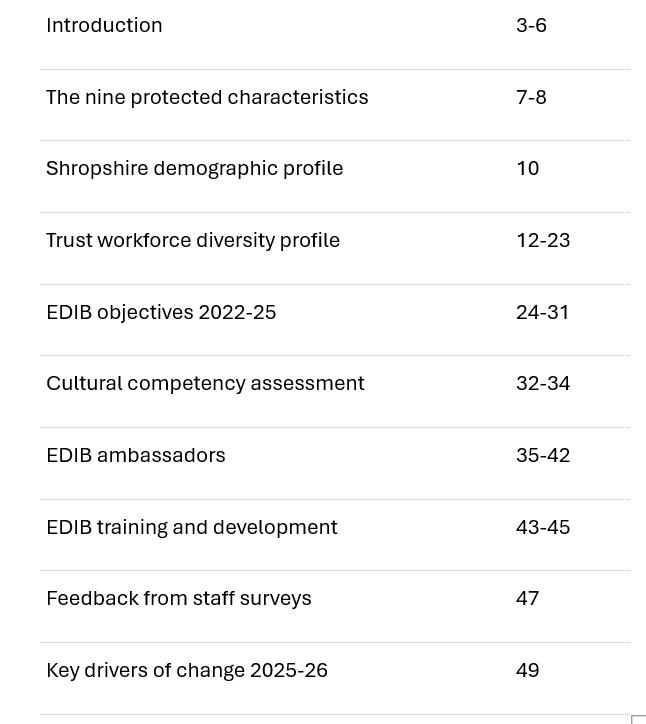

INTRODUCTION
Introduction
As part of our duties under The Equality Act (2010), Marches Academy Trust is required to produce and publish an annual report outlining the progress that we have made against our objectives which are set out in our EDIB Strategy 2022-25.
This report sets out a summary of the work undertaken in 2024 - 2025 against our objectives and outcomes, an update on work to meet each objective and finally, our workforce equality data which is also a publishing requirement under The Equality Act (2010).
Investing in embedding EDIB as a golden thread across the work of the Trust.
Equality, diversity, inclusion and belonging is essential for both our workforce and our children and young people. Our vision of Achievement through Caring means we want to make sure all our staff and learners can thrive and reach their full potential. By raising awareness of the many aspects of diversity, how to eliminate discrimination, promote equality of opportunity and foster good relations, we are empowering our workforce and preparing our children and young people to become good global citizens.
The Trust values each person equally. We are committed to building a diverse team and embedding a welcoming, inclusive culture that encourages diversity and authenticity. We believe this will encourage creative ways of thinking, ensuring we collaborate more effectively and achieve better outcomes.
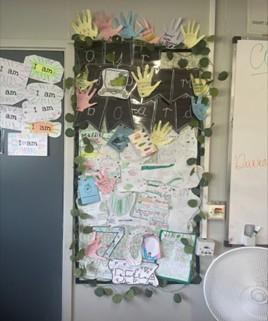
Annual Report 2024 - 2025
This report reflects the work of our EDIB Ambassadors, our schools and our Trust, under the lead of The Executive Director of People and Development, during this reporting period. It will evidence how, as a Trust, we have considered our Equality Act and Public Sector Equality Duty (PSED) responsibilities.
The Equality Act 2010 (Specific Duties) Regulations 2011 require The Marches Academy Trust to:
Publish information to show compliance with the PSED, at least once a year.
Produce Equality Objectives at least every four years.
The Public Sector Equality Duties state we must have ‘due regard’ to :
Eliminate discrimination, harassment, victimisation, and any ither conduct prohibited within The Equality Act 2010
Advancing equality of opportunity between persons who share a relevant protected characteristic and persons who don’t
Fostering good relations between persons who share a relevant protected characteristic and those who don’t.
Advancing equal opportunities means:
Removing or reducing the disadvantage people with protected characteristics face
Taking steps to meet the specific needs of people with protected characteristics
Encouraging people with protected characteristics to participate fully in all activities, especially when they are underrepresented.
Other Considerations:
The Children’s and Families Act 2014
Reinforces wider reforms to ensure that all children and young people can succeed, no matter what their background. The act will reform the systems for adoption, looked-after children, family justice and special educational needs. It will introduce changes to support the welfare of children.13 Mar 2014

General information

Ofsted inspections, updated in 2025, will focus on how schools teach about the protected characteristics as part of the broader "personal development" judgement. This includes ensuring schools promote equality and tackle discrimination based on characteristics like age, disability, gender reassignment, and more. Schools need to demonstrate how they embed this teaching throughout the curriculum, rather than in isolated lessons, and ensure pupils understand the importance of these characteristics in a way appropriate for their age.
Key Aspects of Ofsted's Approach:
Integration into the Curriculum:
Ofsted emphasises that teaching about protected characteristics should be woven into the curriculum, rather than treated as separate topics or one-off lessons.
Age-Appropriate Content:
The guidance requires schools to tailor the content and depth of discussions about protected characteristics to the age and developmental stage of their pupils.
Promoting Equality and Tackling Discrimination:
Schools are expected to actively demonstrate how they create a culture where discrimination is not tolerated and how they promote understanding and respect for all individuals, regardless of their protected characteristics.
Personal Development Judgement:
The teaching of protected characteristics is a key component of Ofsted's "personal development" judgement, which also includes areas like well-being, character development, and spiritual, moral, social, and cultural development.
Five Key Judgement Areas:
Ofsted will continue to make graded judgments on Overall effectiveness, Quality of education, Behaviour and attitudes, Personal development, and Leadership and management.
Specific Examples:
Primary Schools: Could integrate conversations about family diversity into lessons.
Secondary Schools: Could delve deeper into topics like gender identity.
Government Publication – inspecting the teaching of the protected characteristics
Faith teachings on protected characteristics
Schools can choose to teach the tenets of any faith on the protected characteristics. For example, they may explain that same-sex relationships and gender reassignment are not permitted by a particular religion. However, if they do so, they must also explain the legal rights LGBT people have under UK law, and that this and LGBT people must be respected.
Consequences of Inadequate Provision:
Requires Improvement: Schools that do not effectively promote awareness and understanding of protected characteristics may receive a "requires improvement" rating.
Nine protected characteristics
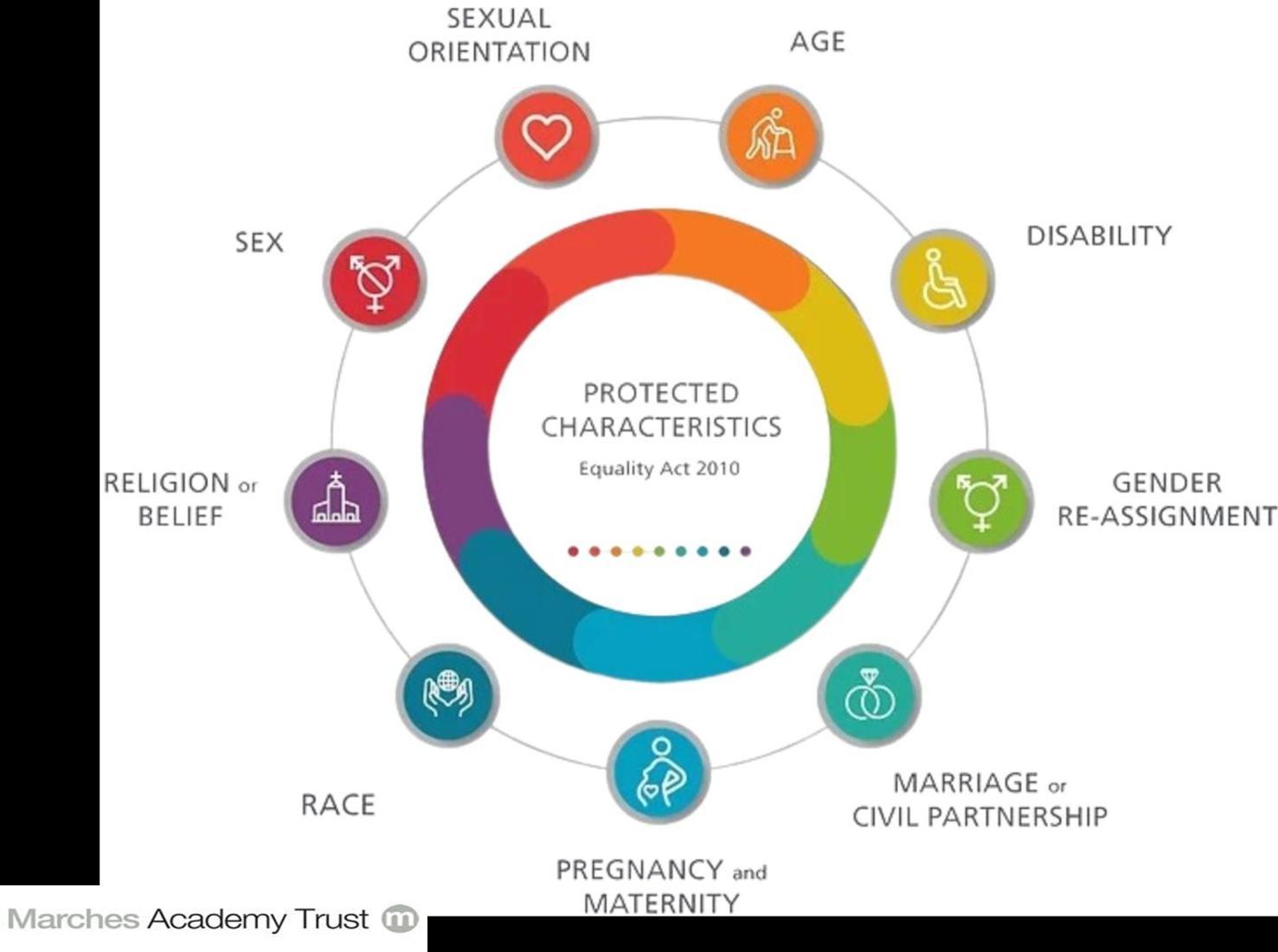
Nine protected characteristics
The nine protected characteristics are age, disability, gender reassignment, marriage and civil partnership, pregnancy and maternity, religion and belief, race, sex, and sexual orientation.
In delivering the first phase of the EDIB Strategy it has provided us as a Trust with an opportunity to make change, transform systems, processes and engage in a fully inclusive way as we strive to listen, adapt and make changes where we can.
We acknowledge that whilst we have a strong foundation of work embedded since the inception of the strategy in 2022, we have a significant journey ahead to enable our objectives, culture and engagement work. The challenge is being met with enthusiasm, passion, commitment and resource to fully and effectively implement the changes we want to see.
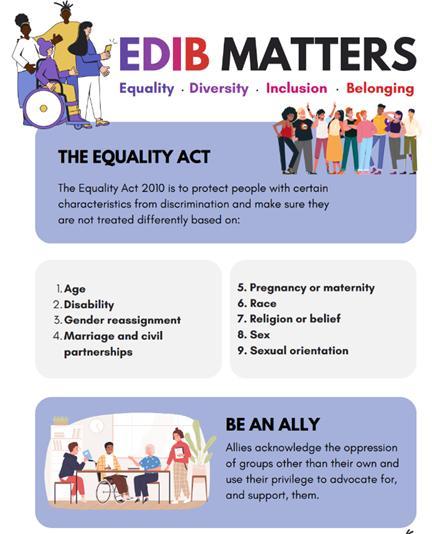
SHROPSHIRE DEMOGRAPHIC PROFILE
Shropshire demographic profile
2021 ONS Census (Fully released 2023)
Gender In the 2021 census the population of Shropshire was 323,600 and is made up of approximately 50.7% females and 49.3% males.
The average age of people in Shropshire is 48, compared to 40 in England. 5.9% of people living in Shropshire in 2021 were born outside of the UK, compared to 17.4% nationally.
The religious make up of Shropshire is 55.5% Christian, 37.0% No religion, 0.5% Muslim, 0.3% Buddhist, 0.2% Hindu, 0.2% Sikh, 0.1 Jewish, 0.5% other religion.
Sexual Identity 90.6% within Shropshire identify as straight or heterosexual, 1.2% identify as gay or lesbian, 0.96% identify as bisexual, 0.12% identify as pansexual, 0.04% identify as asexual, 0.01% identify as queer, and 0.01% identify as another sexual orientation.
93.98% of people have a gender identity the same as their sex registered at birth, 0.11% of people have a gender identity different from their sex registered at birth but no identity given. 0.05% are registered as a trans woman and 0.06% are a trans man.0.04% are non-binary.
Within Shropshire 18.5 are classified as disabled under the Equality Act 2010 and 81.5% not disabled under the Equality Act 2010.
Ethnicity and Diversity:
• In 2021, 96.7% of Shropshire's population identified as white, according to the 2021 census.
• This is higher than the proportion of white people in England (81%) and the West Midlands (81.7%).
• Shropshire has a lower proportion of ethnic minority groups compared to England and the West Midlands.
Other Notable Demographics:
• The median age in Shropshire increased from 44 to 48 between the last two censuses, according to the ONS.
• The most common religious group is Christian, with 52.6% of residents identifying as such.
• 38.4% of residents reported having no religion.
• The Muslim population has increased from 700 in 2011 to 1700 in 2021 according to a Shropshire Council report

WORKFORCE DIVERSITY PROFILE
Workforce diversity profile
Data available from HR: Gender distribution and Age Band Demographics:
* There is no further data in the HR system to date The workforce and Diversity Survey was carried out on Microsoft forms in September 2024 by Executive Director of People and Development to ensure additional robust data to benchmark against census and inform the Trust’s practice.
For 2025 – 2026:
HR will be gathering/have all the demographics HR will report on the Trust demographics in full to the Board of Trustees.
Feedback from the staff diversity indicators survey
Autumn term 2024:
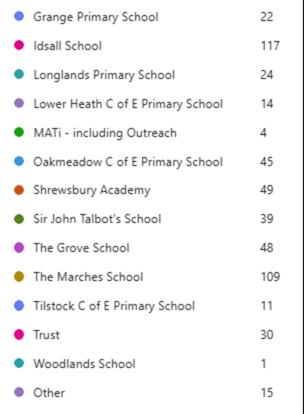
What is your gender?
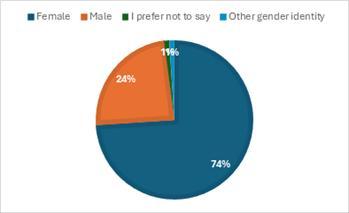
Feedback from the staff diversity indicators survey
Do you have a disability?
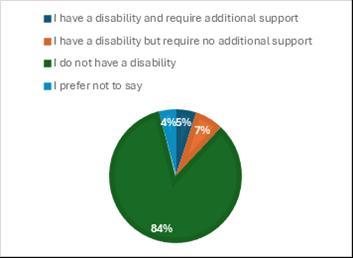
Which of the following best describes your sexual orientation?
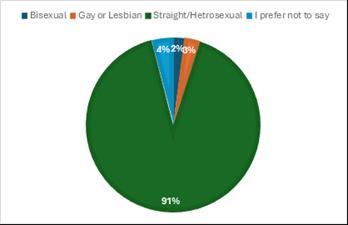
Feedback from the staff diversity indicators survey
What is your ethnic group?
What is your religion?
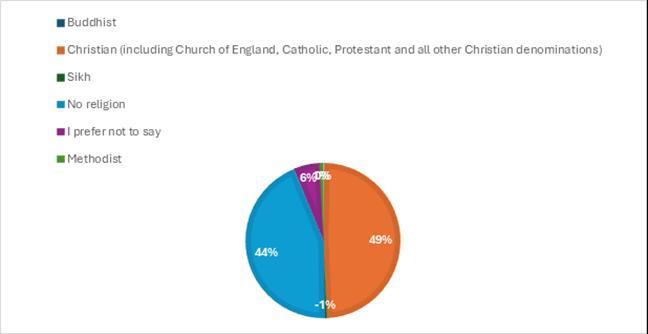
Feedback from the staff diversity indicators survey
Additional key data collected on Trust Survey on Learning Impairments and Neurodiversity.
To Create a More Inclusive Workplace
• Knowing the makeup of our workforce helps us create policies, practices, and environments that are accessible and inclusive.
• It allows us to identify and remove potential barriers that may be affecting staff with neurodiverse conditions or learning impairments
To Inform Training and Awareness
• Data enables us to provide more relevant training for leaders and teams to raise awareness of neurodiversity and learning differences.
• This fosters a more understanding and respectful culture where everyone feels valued and seen.
Because Representation Matters
• When people with neurodiverse conditions and learning impairments see themselves represented in our data and in our conversations about diversity, it affirms their place in our community.
• It encourages openness, reduces stigma, and helps build a culture where everyone feels safe being themselves.
Supporting Our Students Starts with Supporting Our Staff
• As a Trust that serves diverse learners including many with neurodiverse conditions it’s vital that our workforce reflects, understands, and champions this diversity.
• When our staff feel supported, they are better able to support students, model inclusion, and contribute to a culture of belonging throughout our schools.
Any learning impairments or neurodiversity conditions?
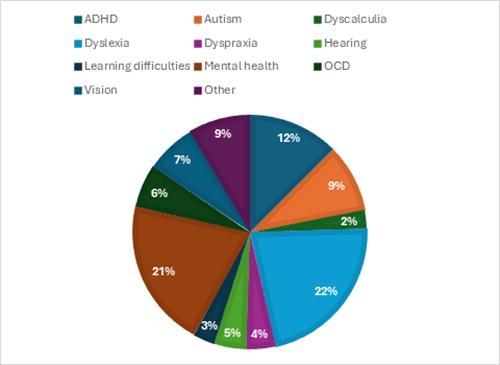
Feedback from the governor diversity indicators survey
Autumn term 2024
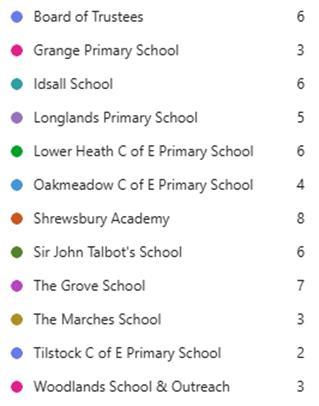
Feedback from the governor diversity indicators survey
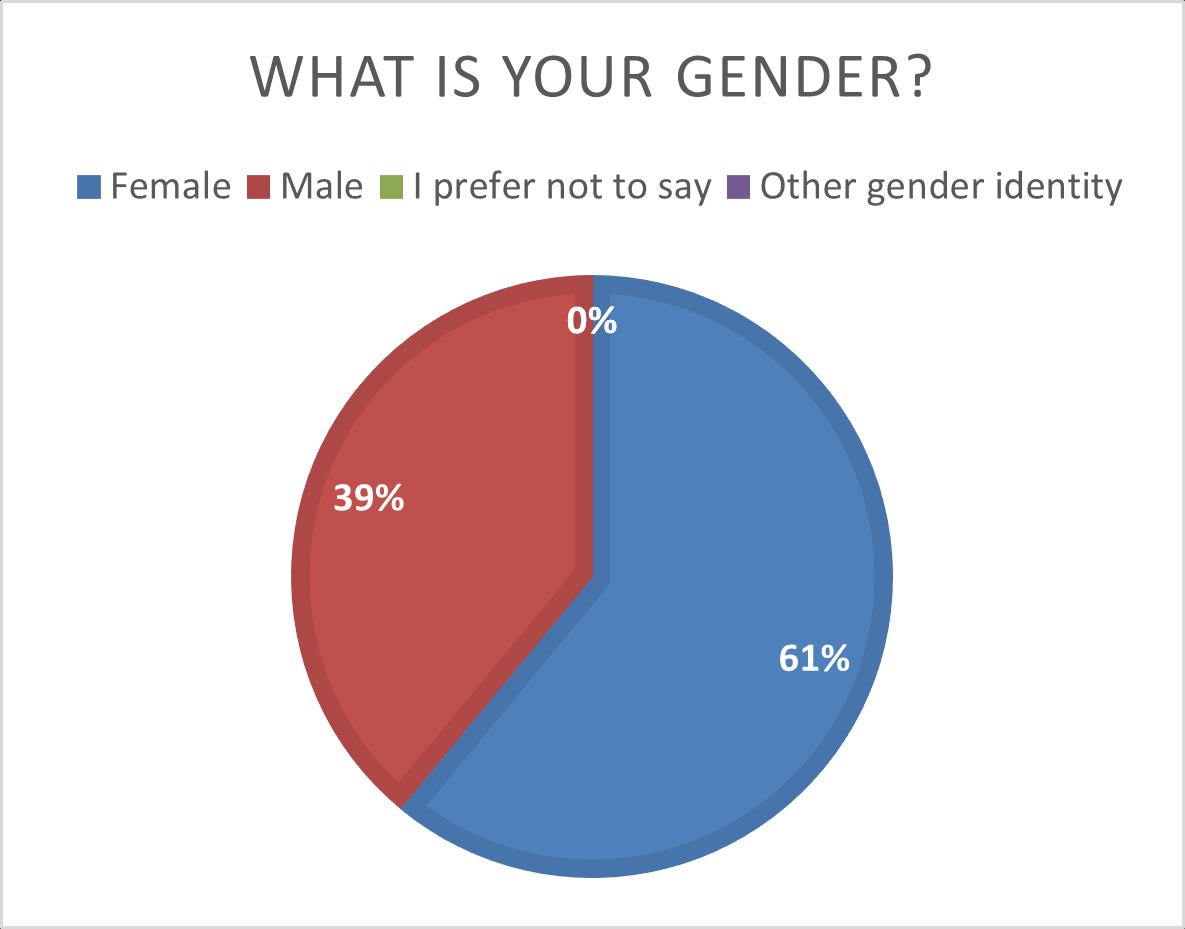
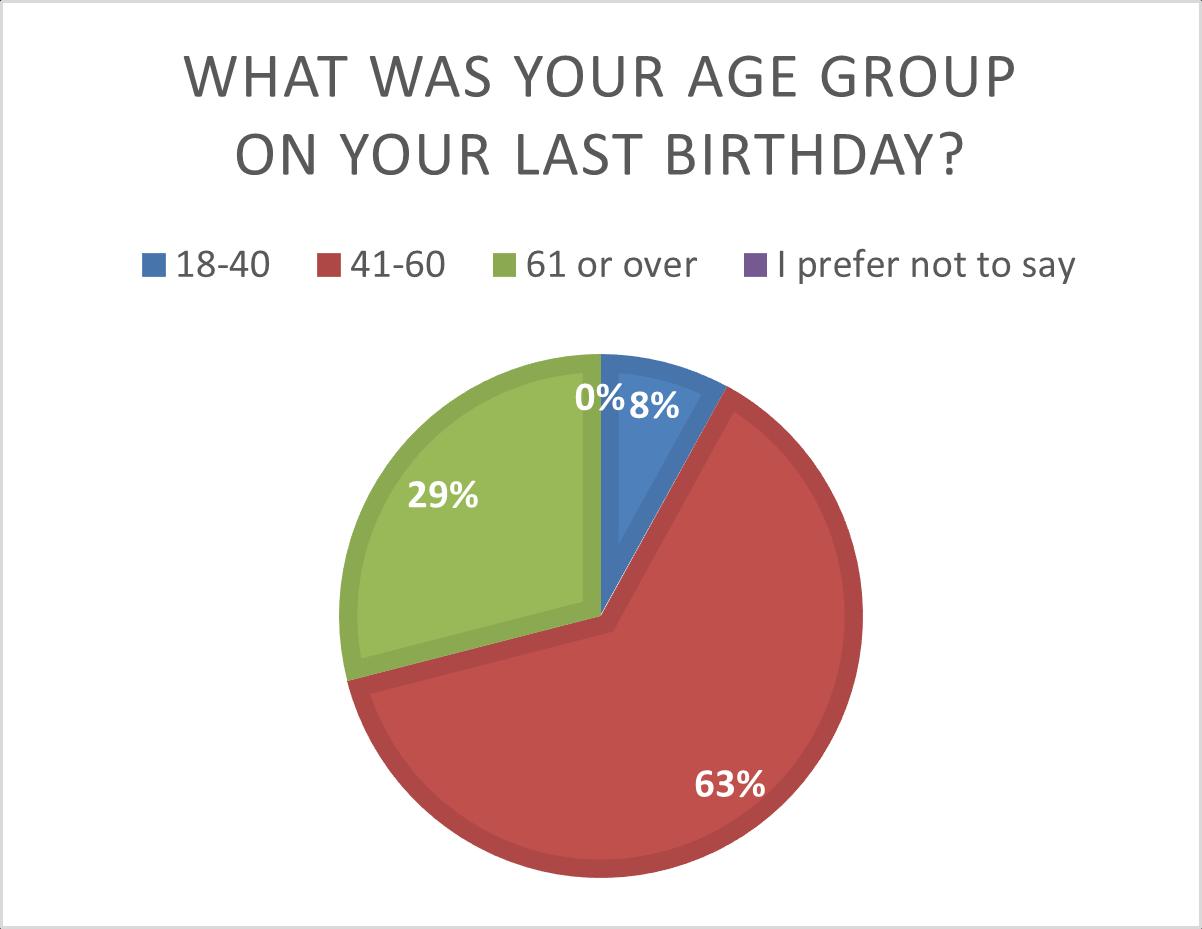
Feedback from the governor diversity indicators survey
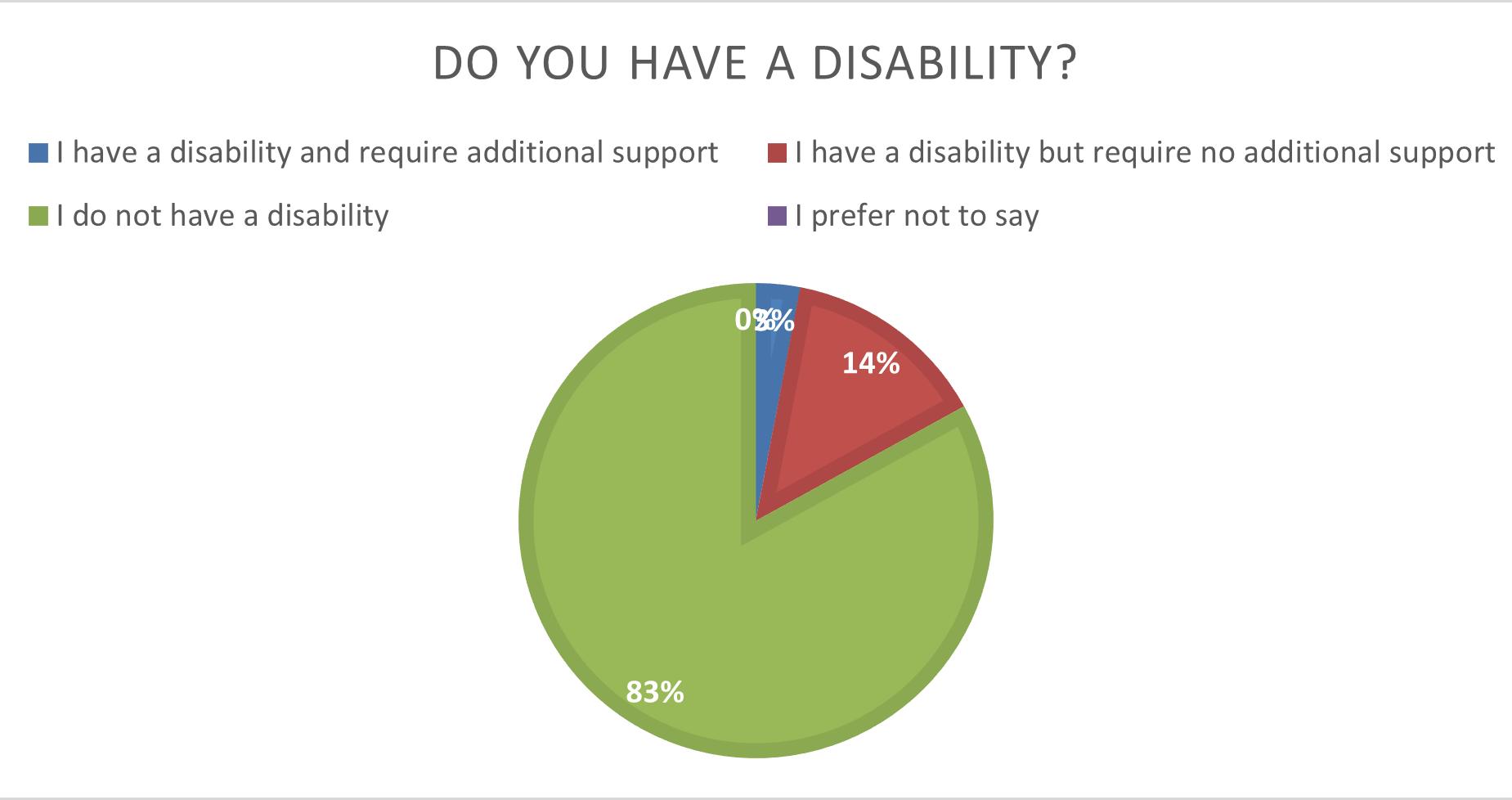

Feedback from the governor diversity indicators survey
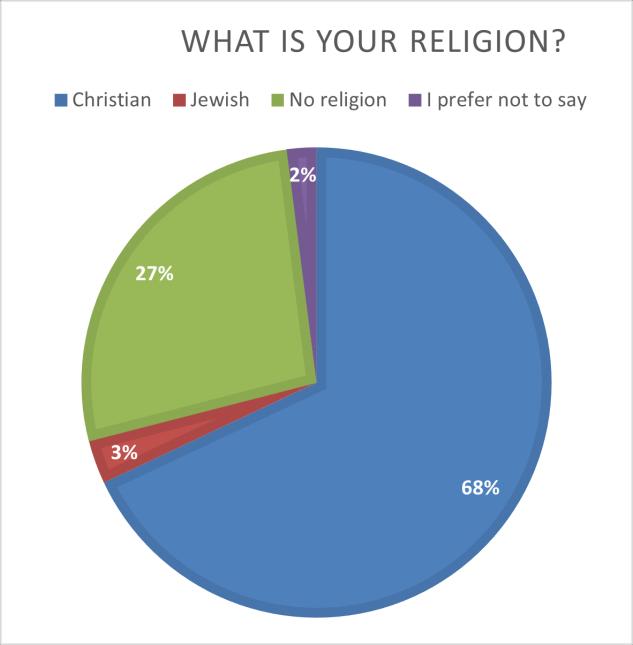
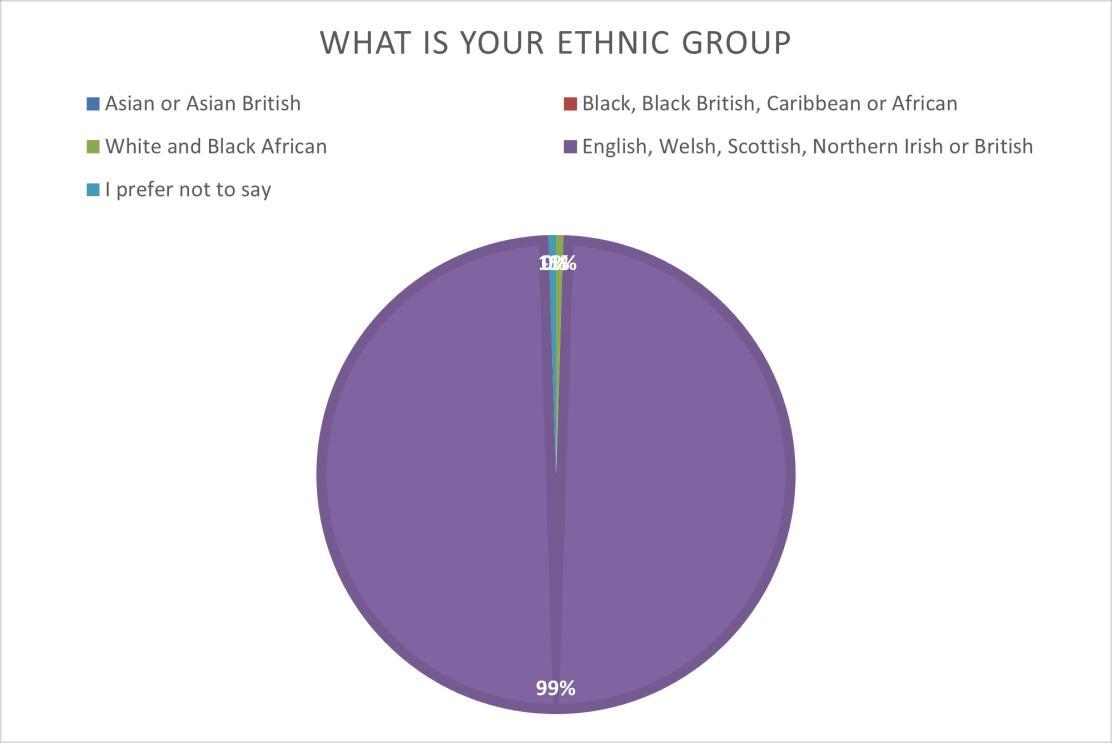
Feedback from the governor diversity indicators survey
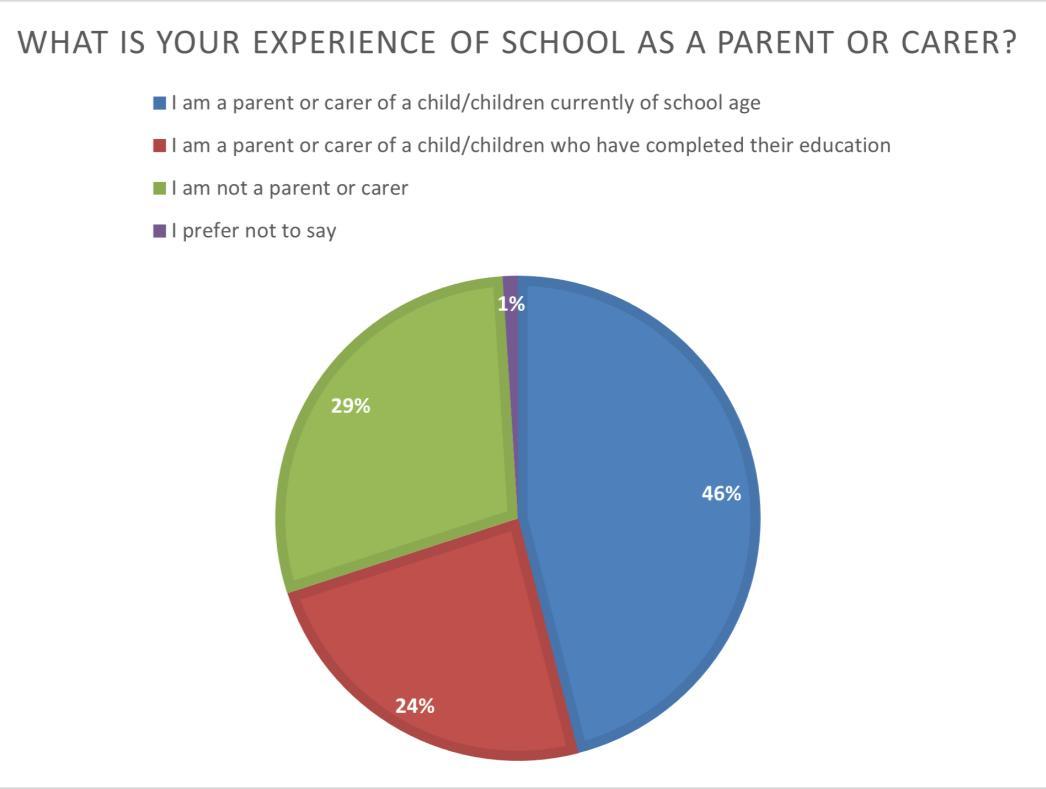
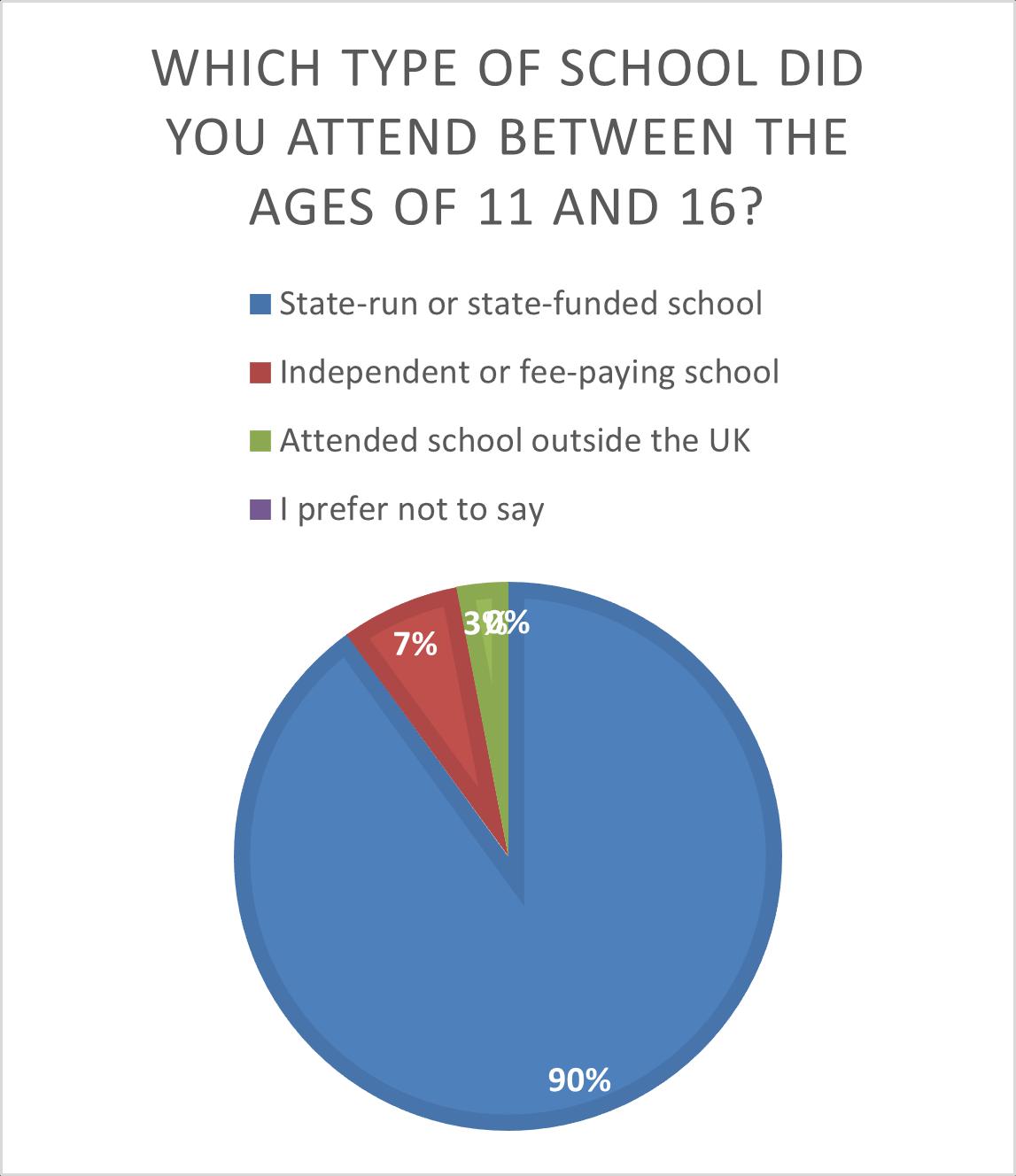
Feedback from the governor diversity indicators survey

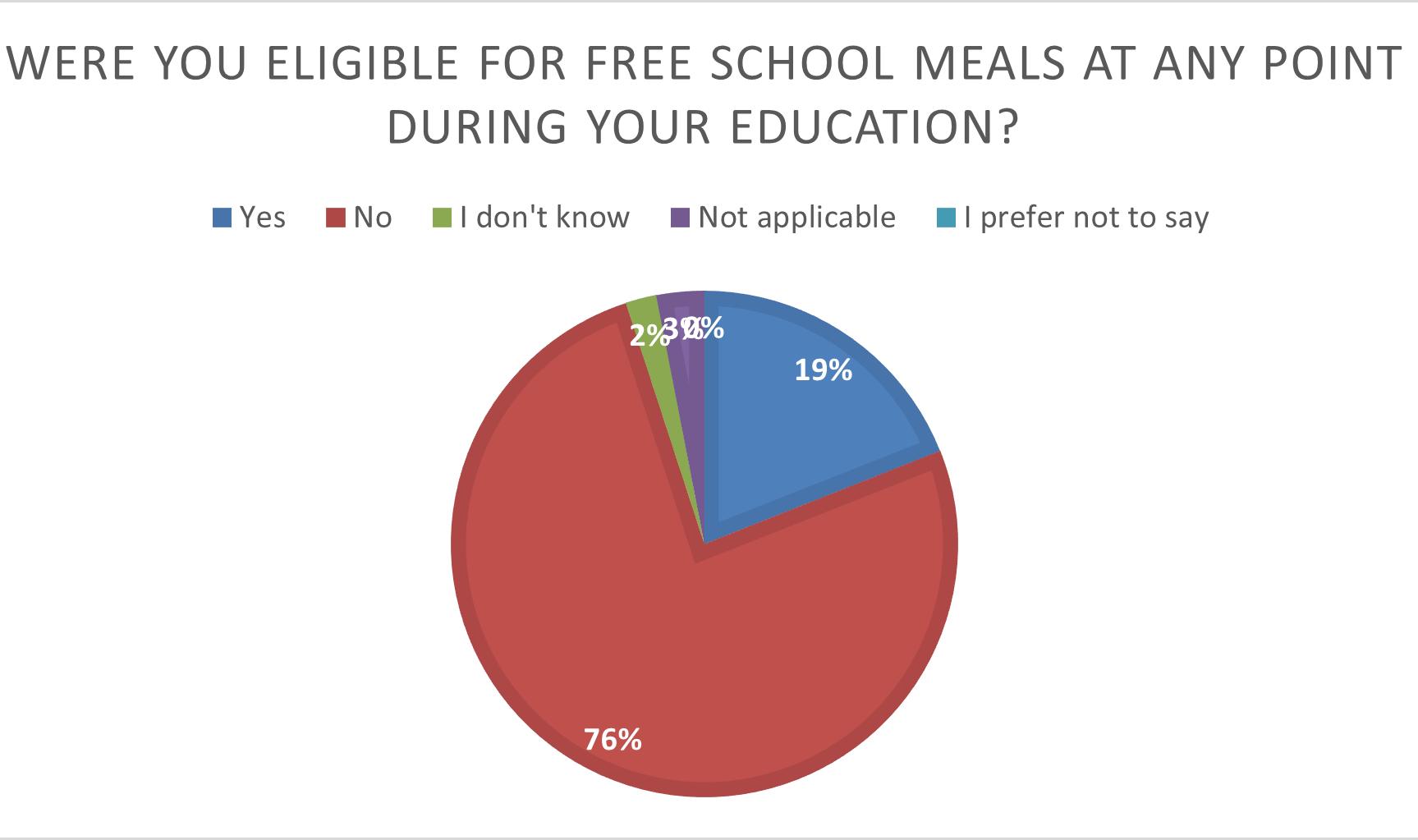
Feedback from the governor diversity indicators survey
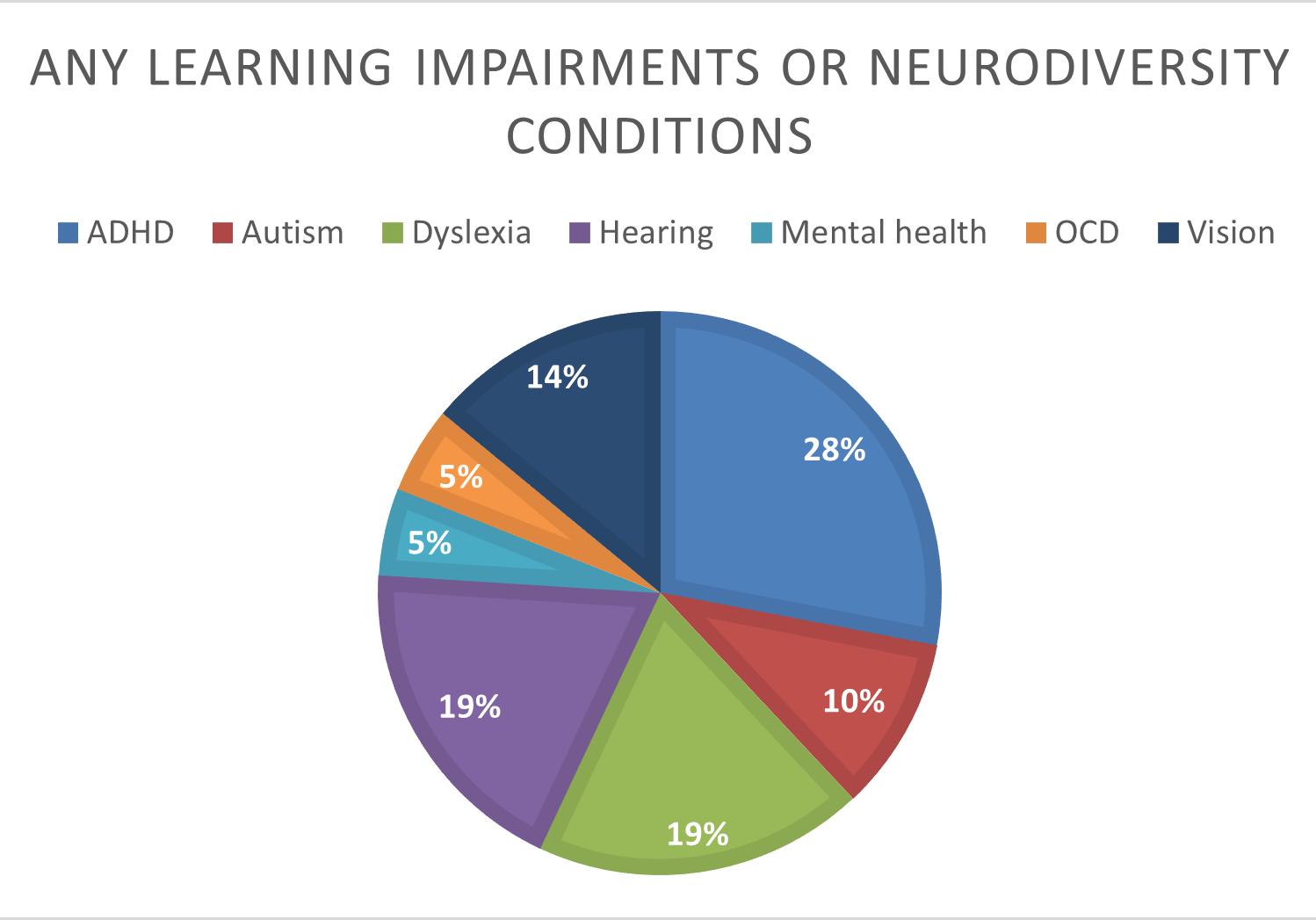
TRUST AND SCHOOL OBJECTIVES
Marches Academy Trust EDIB
Objectives
2022–25
Reporting on the EDIB Objectives
The Equality Act 2010 (Specific Duties) Regulations 2011
Marches Academy Trust is required to publish information annually to evidence compliance with the Equality Acts Public Sector Equality Duty (PSED). This annual report provides summary information on progress against our equality objectives along with other activity, good practice or associated mechanisms used to demonstrate compliance with the PSED three aims and other statutory requirements. Information on our EDIB strategy will be published throughout the year, internally and on MMAT and individual school’s website.
Marches Academy Trust are embracing its EDIB responsibilities along with providing assurances that our schools are progressing and are supported in meeting these responsibilities. The Trust’s Executive Director for People and Development leads our schools to set EDIB priorities and objectives to support the Trust’s vision of being an inclusive organisation.
EDIB Priorities for 2024/25
School Objectives:
Objective 1: All members of our school community create a positive, safe environment in which everyone is treated respectfully.
Introduce Ban the Banter and a four tier system to support our children and young people to understand the importance of treating everyone with kindness and respect
Objective 2: Our curriculum will develop and reflect the diverse society we live in.
School Objectives Final Review
Marches Academy Trust EDIB Objectives 2022–25
Building Respectful, Inclusive Communities: A Review of School Objectives 2024 - 2025 Progress, Milestones, and Impact Across Our Schools
In the academic year 2024–2025, schools across the trust committed to transformative objectives centred on respect, inclusion, diversity, and a positive community ethos. Through collective effort, innovative programmes, and ongoing reflection, each school has contributed to a culture where every member feels valued and empowered to thrive.
Objective 1: All members of our school community create a positive, safe environment in which everyone is treated respectfully
The foundational goal for every school was to create a positive, safe environment in which all individuals, children, staff, and families are treated with respect and dignity. While each school adapted its approach to its unique context, common threads of restorative practice, awareness campaigns, and policy development wove the fabric of this shared mission.
Celebrating Differences and Promoting Kindness
Across the schools, celebrating difference was central to daily life. Children and staff alike engaged in programmes and discussions exploring neurodiversity, protected characteristics, and the power of language. Initiatives such as The Kindness Project and "In the Eyes of..." sessions exposed students to a broad spectrum of identities and experiences, cultivating empathy and understanding. Schools marked key awareness events - Pride Month, Black History Month, Holocaust Memorial, International Men’s and Women’s Days, Neurodiversity Celebration Week bringing external speakers, workshops, and themed assemblies to widen perspectives.
Ban the Banter: Embedding Respect in Language and Action
A pivotal initiative was the introduction and embedding of the "Ban the Banter" (BtB) policy alongside a four-tier system for addressing discriminatory language and incidents. Students, staff, and families were informed through assemblies, letters, and training. Personal Development lessons, restorative workshops, and targeted interventions reinforced the message: discrimination is never "just banter." Data-driven approaches played a crucial role. Incidents were meticulously logged via Arbor, CPOMS, and other reporting systems, enabling rapid intervention and trend analysis. Regular reviews and pupil voice surveys indicated a marked decline in discriminatory incidents, with students increasingly holding each other to account and understanding the impact of their words.
Marches Academy Trust EDIB Objectives 2022–25
Restorative Practices and Staff Empowerment
Restorative practice workshops for students and CPD for staff ensured that incidents were addressed constructively. Staff confidence in intervention and reporting grew, as evidenced by high percentages of staff expressing trust in systems for support and a clear reduction in incidents.
Schools made strides in involving parents and the wider community. Newsletters, open-door policies, and community links fostered transparency, while ambassadors and student councils championed respect and belonging. Initiatives like Mental Health Heroes and Respect Ambassadors offered leadership and peer support opportunities, further embedding positive values.
Data and Impact Highlights
Year 9 students (147 individuals) completed a Level 2 Mental Health Qualification, equipping them to support themselves and peers.
Targeted recording and follow-up of slur and discrimination incidents enabled identification of gaps and informed curriculum adjustments.
Consistent decreases in discriminatory incidents were reported, with some schools noting up to 60% reduction since the autumn term. For example, Marches recorded a reduction from 86 incidents in Autumn to 30 in Summer.
Restorative booklets, assemblies, and student-led surveys provided qualitative evidence of growing understanding and respect.
Accreditation progress included achievement of the "Student Voice" and "Pastoral Support" badges of the Rainbow Flag Award.
Objective 2: Developing a Curriculum Reflective of Diverse Society
Parallel to fostering a respectful environment, schools committed to reviewing and enriching their curricula to recognise and celebrate the diversity of modern society. This work was visible in both the content taught and the methods used to engage students in meaningful learning.
Curriculum Audits and Subject Development
Subject leaders and faculty directors undertook audits and action plans with an "EDIB lens", ensuring that resources, examples, and discussions represented minority groups and a range of experiences. New resources were purchased and adapted to fill gaps, particularly in PSHCE (Personal, Social, Health, and Citizenship Education).
Assemblies and lesson plans highlighted national and global diversity, with increased staff CPD time allocated for developing inclusive materials. Student and parent voice played a vital role, informing content and calendar events, such as Culture Con, Neurodiversity Week, and visits from diverse faith communities
. Student Parliament and Inclusive Leadership
Student participation was further strengthened through the formation of parliaments and councils dedicated to inclusion and diversity. Shrewsbury Academy, for instance, launched a Student Parliament with positions focused on representation across year groups, amplifying voices and fostering ownership of school culture.
Marches Academy Trust EDIB Objectives 2022–25
Celebrating Religious and Cultural Difference
Religious Education (RE) curricula were reviewed and developed, with schools planning and delivering lessons and assemblies on a wide variety of faiths, cultures, and traditions. Visits to places of worship, guest speakers from different backgrounds, and cultural festivals such as Diwali dance workshops and trips to Gurdwaras enriched students’ understanding and appreciation.
Measuring Progress and Looking Ahead
Regular audits, surveys, and feedback mechanisms ensured that progress was tracked and objectives adjusted as needed. Some key achievements included:
Awarding of the "Inclusive Curriculum" badge of the Rainbow Flag Award following enhanced lesson resources and diversity audits.
The creation of EDIB calendars and MAT NAVs (Multi-Academy Trust Navigation documents) to guide and embed inclusion across departments and years.
Integration of global and community links, such as the International School Award and partnerships with schools abroad, broadening students’ horizons beyond local boundaries.
School reading and art curricula incorporated a greater variety of authors, artists, and historical contexts, reflecting Britain’s multicultural society.
Pupil voice surveys consistently indicated that children could articulate the importance of difference and felt their experiences were represented in lessons.
Shared Services and Trust-Wide Initiatives
Across the trust, Shared Services undertook parallel objectives to foster a culture of respect and EDIB among staff.
Banning the Banter sessions were adapted for an adult audiences, staff-specific posters were created demonstrating that inclusion is not just a student issue, but a cornerstone of the entire educational community.
Challenges, Adaptations, and Reflections
While progress has been made, in our end of year review the ambassadors highlighted ongoing challenges and opportunities for growth:
• Ensuring consistency in logging and addressing incidents some schools identified gaps in CPOMS usage and are working to improve fidelity and training.
• Embedding new initiatives, such as restorative booklets or multi-faith visits, in a sustainable way amid funding and logistical constraints.
• Continuing to strengthen community links and representation, particularly in less diverse contexts, through innovative partnerships and targeted outreach.
• Maintaining momentum and visibility for EDIB objectives as student cohorts and staff teams evolve year to year.
Conclusion: Towards a Culture of Belonging
The 2024 - 2025 final review illustrates a vibrant picture of schools not only meeting, but in many cases exceeding, ambitious objectives for respect, inclusion, and diversity. Through clear policies, embedded restorative practice, dynamic curricula, and the authentic involvement of students, staff, and families, the trust lays a foundation for continued progress.
Marches Academy Trust EDIB Objectives 2023–25
EDIB
Objective
1 Inclusive and Diverse Workforce
The Trust has a culture of an inclusive and diverse workforce - enabling us to draw upon the widest possible range of views, experiences, and opinions. The Trust and schools are clear about its workforce profile being representative of the communities it serves and there is equality of opportunity for all staff.
Comparison of our Workforce data and the Shropshire Census confirms our staff are representative of the community we serve.
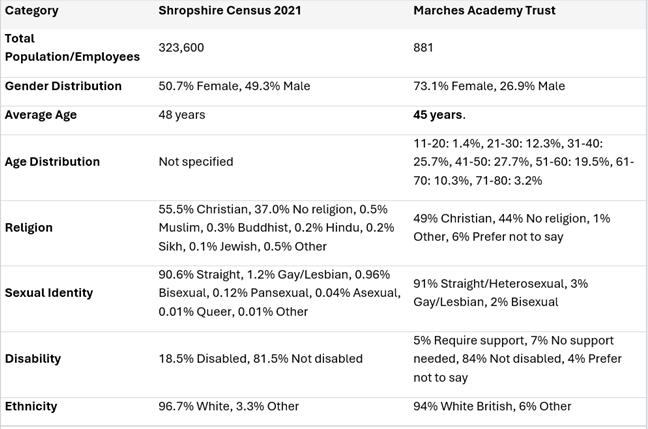
EDIB Objective
2 EDIB Related Policies and Procedures
The Trust has a range of EDIB related policies procedures and initiatives in place which are reviewed regularly and assessed to ensure fairness and equity.
EDIB Objective
3 Governance Process
The EDIB governance structure provides robust and inclusive governance. The Trust has a structured and transparent process in place where the development of its EDIB agenda is shared with a range of stakeholders and their views are considered and can influence the EDIB priorities.
Marches Academy Trust EDIB Objectives 2023–25
Marches Academy Trust provide governance for EDIB through the following arrangements:
Board of Trustees provide the leadership and have overall decision-making responsibilities for MAT.
The Executive Team receive regular updates from the Executive lead of People and Development and ensure the EDIB strategic plan is achieving its identified aims and objectives within scheduled timeframes.
The EDIB committee represents the Trust, School Leaders and stakeholder groups who have recommendation and decision-making responsibilities. The committee brings together representatives from Head Teachers, EDIB Ambassadors, Trustees, Local School Governors, Teaching and Non-Teaching Staff, Children and Young People, Unions, Parents and other stakeholders.
Local Governing Body – each school has a Local Governing Body who have oversight of decisionmaking responsibilities for the School’s EDIB agenda.
School Heads and EDIB Ambassadors – play a crucial role and are the glue that binds the EDIB governance structure. They foster good relations and are key influencers between the diverse groups that make up the governance structure.
The Staff Working Parties are in various stages across our schools stage. In 2025 – 2026 these will be developed to provide a platform for staff at all levels and from a range of areas and departments. Through EDIB CYP related groups set up in schools, we are developing a platform for our Children and Young People to be involved in the way the schools develop the EDIB Strategy.
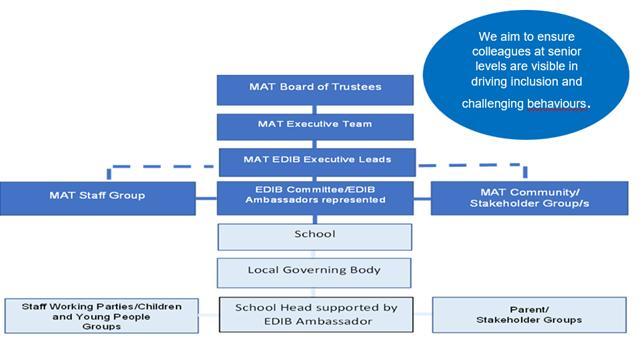
Marches Academy Trust EDIB
Objectives 2023–25
EDIB Objective 4 Leadership, Compliance and Organisational Development
Governing Bodies/Trustees and Senior Managers take responsibility for promoting EDIB.
The Trust produces and publishes information to demonstrate compliance with the Equality Act and its duties.
Regular reports are shared with local Governing Bodies and Trustees.
An Annual report publishes information to demonstrate compliance with the Equality Act and its duties.
CULTURAL COMPETENCY ASSESSMENT
Cultural competency assessment
The implementation of the Cultural Competency Framework has underpinned the development of the EDIB strategy and the formulation of school-specific EDIB objectives. Each thematic area is evaluated through clearly defined outcomes corresponding to four progressive stages: Beginning, Developing, Embedding, and Leading.

Baseline assessments conducted in September 2022 provided grade ratings across schools, which have since been revisited in the 2025 Cultural Competency Assessments. These assessments reveal a natural variation in progress across schools, ranging from the Developing to Embedding stages, as anticipated with the ongoing rollout of the strategy. Notably, the overall average ratings have shown improvement, with a significant increase in instances of Embedding particularly evident within Leadership and Curriculum Design and Delivery.
Baseline Assessment: Cultural Competency Assessment Grade Ratings across Schools September 2022
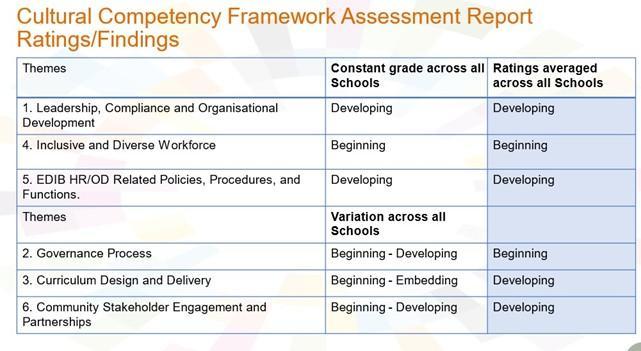
Cultural competency assessment
Cultural Competency Assessments 2025 – by school
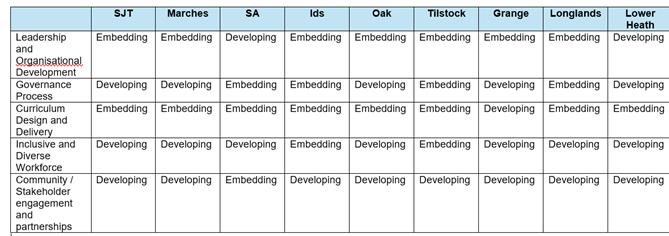

EDIB AMBASSADORS
EDIB ambassadors

Our Ambassadors promote and advocate for Equality, Diversity, Inclusion, and Belonging in their schools and across the Trust; helping to create a culture of collaboration, innovation, and belonging. Their role is to ensure that staff are aware of their responsibility to support inclusion, and to help drive cultural and behavioural change. A key part of their role is to monitor and evaluate the impact and effectiveness of progress and identify areas for improvement
EDIB Ambassador Training
Our Trust training equips our ambassadors with the skills required to deliver the EDIB strategic objectives. Training to date has explored and clarified the role of the ambassador, discovering how to unlock the influence and impact that ambassadors can have in achieving an inclusive culture.
The training run by the Executive Lead for People and Development has supported ambassadors to:
• Set school EDIB objectives and map these against their SDP and the Trust’s EDIB objectives
• Confidently influence and have impact
• Measure their success and share that knowledge with stakeholders
• Be an Influencer and develop EDIB Understand strategy and set direction
• Understand Resistance
• Utilise basic coaching skills
• Have facilitator training to run workshops in school and at our MAT Conference
• Develop in confidence to have a voice
Supporting and empowering our ambassadors:
• We provide regular feedback, recognition, and appreciation for their efforts and achievements.
• Create a safe and supportive space for them to share their experiences, challenges, and learnings with each other.
• Give them autonomy, authority, and resources to implement their ideas and actions.
• Involve them in decision- making and planning processes, and solicit their input and feedback on diversity and inclusion issues and opportunities.
• Most importantly we show them how their work matters and makes a difference for their colleagues, stakeholders, and communities.
• Our Ambassadors regularly self-evaluate their school’s performance against their school objectives and share with their governing bodies and staff.
Our EDIB Ambassadors have:
• A passion for inclusivity
• The ability to working effectively with their teams and lead on driving sustainable improvements.
• Commitment to developing the effective practice of others.
• The opportunity to:
• Be part of a working party of dedicated and enthusiastic colleagues driving change.
• Receive training in coaching and how to deliver training.
• Develop and share experience; and learn from effective practice Deepen leadership skills
• Gain excellent experience to support career development
EDIB ambassadors

EDIB ambassadors

EDIB ambassadors

EDIB ambassadors

EDIB ambassadors

EDIB ambassadors
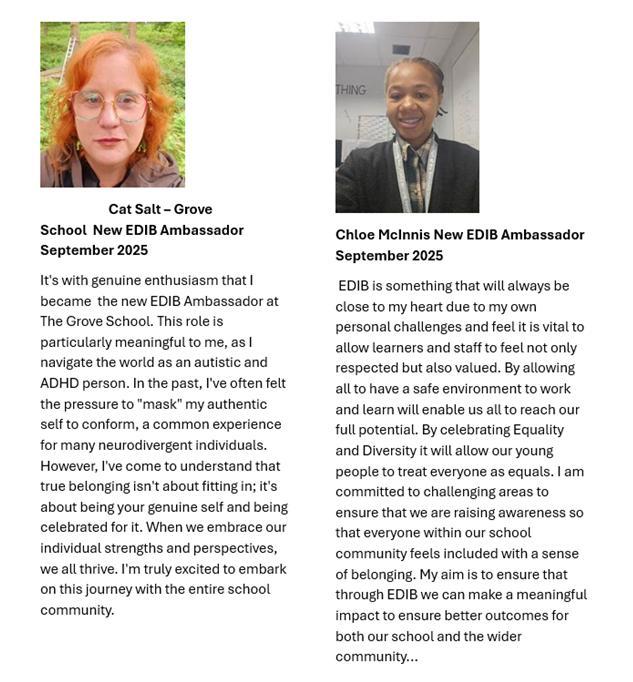
EDIB TRAINING AND DEVELOPMENT
EDIB training and development
All school teaching staff completed the EDIB training sessions set out on the MMAT Professional Learning Plan 2024– 2025.
EDIB 1 - MAT Professional Learning Banning the Banter 5th December 2024
Will this session impact on your work-based practice
Overall:
Strongly agree/ Agree – 99%
Key Learning Points that I will take into everyday practice:
How to deal with different types of parental responses to phone calls home about discriminatory talk, Trans is the most common group left out of representation, talk that happens in staff spaces is as important as talk that happens in student spaces
Being clear about exactly what 'banter' is and how it can be observed in our context. Having clarity about how the conversation can be had with children. We also had a great discussion about how to have conversations with parents. Discussing this as a group helped us to workshop and share experiences of potentially tricky conversations.
The difference between banter and unkindness. Key phrases for difficult conversations. Reminder why the characteristics are protected.
EDIB 2 - Reach, Teach, Include: Tackling School Avoidance and Neurodiversity Together
This workshop enhanced staff understanding of Emotional Based School Avoidance and its effect on students and reflected on attendance data for each school to identify patterns and areas for improvement. It provided staff with inclusive strategies to support students at risk of EBSA and equipped them with practical classroom adaptations to create a more inclusive and supportive learning environment for everyone. Will this session impact on your work-based practice.
Overall:
Strongly agree /Agree 99%
Key Learning Points that I will take into everyday practice:
⦁ Understanding link between attendance and protected characteristics and being curious about each young person at a human level.
⦁ To ensure pupils with sensory needs are considered. Small changes in class can make a difference
⦁ Reflection on bringing equity, reasonable adjustments and emotional wellbeing into the classroom and recognising the difference between reasonable adjustment and lowering standards.
Our focus is on developing training that is hard-wired to the EDIB agenda’s purpose, values and frameworks.
Our EDIB staff training focuses on behaviour change and has tips, techniques and practical take-aways to impact on work-based practice.
EDIB training for Shared Services
In 2024 – 2025 we ran specific EDIB training for our Shared Services team.
Shared Services PD Day: Inclusive Language & Identity Session
Thursday 5th September 2024
This workshop reflected on the significance of using inclusive language and its impact on identity. The workshop encouraged open-mindedness, awareness, and ongoing learning to foster respectful communication. Emphasis was placed on appropriate terminology, conscious inclusion, and ensuring all voices are heard, highlighting the importance of language in shaping perceptions.
Survey Feedback – Key Learning Points that I will take into everyday practice:
• Awareness of change and the need for open-mindedness and relearning.
• Think before speaking, be prepared to speak up and correct what’s not acceptable.
• Really brilliant to consider the power of language, especially when using common phrases like blind as bat, deaf as post, paranoid. Also, language around gender chairman, manning, etc. It gave food for thought of the way language ingrained in us can be inappropriate & make others feel excluded.
Shared Services PD Day: Unconscious Bias
Friday 18th October 2024, Trust Central
This workshop explored the importance of recognising and understanding different forms of discrimination, bias, and assumptions in the workplace. Participants engaged with real-life scenarios, developed greater awareness of unconscious bias, and reflected on the impact of quick judgments.
Survey Feedback – Key Learning Points that I will take into everyday practice:
• Types of discrimination & real-life scenarios where they are applied, types of bias & assumptions, how to be more conscious of own discrimination.
• The need to have a workforce that is resilient and will provide professional challenge.
• Understanding that everyone has unconscious biases that influence our perceptions, judgments, and decisions. By recognising your own biases, you can take steps to reduce their impact on interactions, especially in diverse environments. Need to continuously self-reflect and acknowledge that biases can shape behaviour in unintended ways.
Banning the Banter Session
Friday 14th February 2025
This workshop document emphasised that inappropriate banter not all banter is discouraged. It highlighted the importance of understanding our EDIB policies, recognising the impact of language, encouraging employees to speak out against unprofessional behaviour, and promoting inclusive, respectful communication in the workplace.
Survey Feedback – Key Learning Points that I will take into everyday practice:
• Helped me understand where the Trusts stance sits more precisely on this matter and where other colleagues in the organisation sit in terms of understanding. It did also prompt me to realise that while I myself am quite proficient with my understanding, the key factor for myself and others will always be that extra little push to actually speak out against unprofessional banter.
• Others' opinions may be different to your own.
• There were some useful examples of ways to tackle people when they say something you feel is inappropriate.
FEEDBACK FROM STAFF SURVEYS
What our staff are saying…
I feel there is a safe space to voice our thoughts and worries. Our work on EDIB is thought provoking and gives us the opportunity to see where we can adapt our curriculum to be more inclusive. Our EDIB ambassador is brilliant and so helpful.
Really informative and thought provoking. I am now respectfully curious about other backgrounds and perspectives and how this frames their learning.
Through the Trust work on EDIB I have made a concerted effort to engage students and try to be more equitable – without having bias judgements on their background based on their ability.
The work on EDIB has enabled staff to reflect and have a professional dialogue with one another to provide an inclusive environment for the children and families.
It is vital that we focus on all the facets of EDIB and not do this as a token gesture.
The EDIB work has concrete strategies to apply to teaching. It has supported me to self-assesses my own bias and to make more meaningful connections with the children and their families
I am more aware of different cultures and religions. Also, I’m more aware of disabilities and how we can share these with the children and have class discussions openly about them.
Key drivers for change 2025-26
To collaborate effectively and empower our staff and CYP to embrace our Equality, Diversity Inclusion and Belonging approach
• To build confidence & skills in our colleagues and future CYP working parties leading on EDIB work
• To ensure regular updates on workforce EDI data (in line with current GDPR, privacy policy and Data Protection)
• To collate feedback on impact and a “You said, we listened, change happened” culture.
• To ensure all communications promote inclusion and belonging
• To ensure our diverse current and potential workforce are valued, respected, and celebrated.
• To develop and deliver a fully inclusive curriculum
• To share and embed the EDIB initiative with our communities
The majority of what we do as a Trust requires us to be collaborative to ensure we effectively deliver relevant and inclusive services to all stakeholders. We know that creativity, innovation and equality, diversity and inclusion go hand in hand when it comes to supporting our staff, CYP and communities in our drive to become a fully inclusive organisation.
The work we have completed and committed to since launching the EDIB Strategy needs to be supported at every level and led and driven through proactive teams and passionate individuals. We have an EDIB Policy that establishes our purpose and processes for those who face discrimination, and we aim to consistently address inequality at given opportunities.

Marches Academy Trust
T. 01691 664400
E. trustadmin@mmat.co.uk
W. marchesacademytrust.co.uk
MarchesAcademyTrust
Marches Academy Trust
